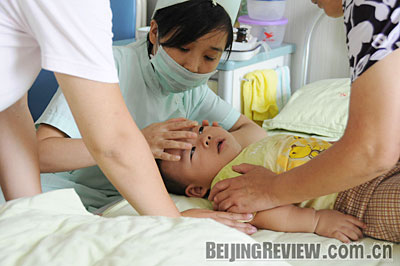|

SICK BABIES: An infant who developed kidney stones after drinking a tainted powdered milk product receives care from a nurse. The government has pledged to cover the costs of medical treatment for the more than 6,200 babies who drank the tainted formula
Thousands of infants in China have developed kidney stones after drinking powdered milk produced by domestic company Sanlu Group Co. (Sanlu) of Hebei Province. The dairy product maker has come under heavy fire from the public since the cases came to light earlier this month.
Xinhua News Agency broke the story on September 9 when it reported that 14 infants in the northwest Gansu Province had been hospitalized with kidney stones in the past two months, after bouts of vomiting and difficult urinating. But kidney stones are rare in infants and no case had been reported in the province in the last two years.
Since then, an overwhelming number of reports about severely ill babies have sprung up around the country. The Ministry of Health said that the number of reported cases of infants with kidney stones had reached 6,244 by September 17 and that three babies had died of the illness.
All the infants were found to have drunk Sanlu powdered milk, a brand that is less expensive relative to its domestic counterparts. Afterward, the company quickly became the object of public anger. That was only the beginning of its ongoing nightmare.
The public outrage intensified when tests found melamine, a chemical toxin, in Sanlu's formula. The substance is often used as an ingredient in plastics, fertilizers and cleaning products. Health experts said the presence of melamine could make the milk's protein content appear higher than in reality in product quality tests, but its ingestion could easily trigger the formation of stones in the urinary tract.
Su Changsheng, Manager of Sanlu's Brand Management Department, told Caijing magazine that the company suspected that some unscrupulous dairy farmers and milk dealers had added melamine to raw milk before selling it to the company. They also added water to the milk so that the diluted liquid could pass quality inspection tests, Su said.
Tian Huawen, President of Sanlu, told the 21st Century Business Herald that the company was totally innocent and had been disgraced by the fraudulent milk suppliers. He said Sanlu had detected melamine in the milk in early August, but he did not explain why they did not inform the public. Tian and Zhang Fawang, Vice Mayor of Shijiazhuang, capital of Hebei Province where Sanlu's headquarters are located, have been removed from office. Zhang was in charge of the city's agriculture.
By September 16, local police had questioned 78 suspects and arrested four of them. The State Council also swiftly responded to the case by setting up an investigation team headed by the Ministry of Health. After completing an initial probe of the case, the team confirmed that Sanlu's formula caused kidney stones of the victimized infants. Severe punishments will be meted out on those responsible.
In addition, the State Council has pledged to shoulder all the costs for the treatment of the sick infants and further improve the country's food security and quality supervision systems. The Ministry of Health also issued a warning on its website for the public to stop using the powdered milk of Sanlu.
Sanlu made a public apology on September 15 and issued an immediate recall of 700 tons of tainted milk powder produced before August 6. Supermarkets in many cities had started to pull the product off their shelves. To completely remove tainted formula from the market, the General Administration of Quality Supervision, Inspection and Quarantine (AQSIQ) has started a nationwide campaign to inspect the country's 109 formula makers. So far, it has detected melamine in the products of 22 of the companies. The AQSIQ has vowed to clear all the tainted formula away from the market and punish the manufacturers.
Wang Dingmian, an executive member of the Dairy Association of China, told Business Daily that whoever would be held responsible for the tainted formula, Sanlu would be the biggest casualty. The company has topped the country's dairy makers in infant formula sales for 15 years in a row. Now the scandal would play into the hands of Sanlu's rivals to grab market share. It also would disrupt the overall domestic powdered milk market by tarnishing the reputation of formula makers and shaking consumer confidence in product quality, he added.
Analysts say it is imperative that Sanlu strengthens its quality control of milk supplies, especially those it purchases directly from dairy farmers, because they are the most vulnerable to adulteration. The company was not monitoring quality control properly because it failed to keep pace with its own enterprise expansion, Wang said.
According to company information, Sanlu's revenues and profits have been growing at double-digit rates for a decade. Since last year it has been preparing for a public listing on the domestic A-share stock exchange to tap into the capital market. Because of this, the expansion-minded dairy maker has been keen on driving up its production regardless of product quality, Wang added.
Industry insiders contend that Sanlu is not the only company that has shown little regard for quality control over its milk sources, but most of them had been able to get by undetected, they said. | 